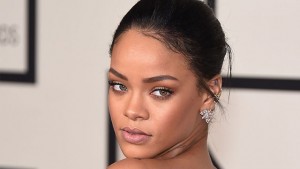 NEW YORK, United States, Monday October 12, 2015 – Barbados’ pop princess Rihanna is one of several artists, including Jay Z, Beyonce, Kanye West and Pharrell Williams, who have jointly sued a Paris clothing retailer they say has been “brazenly” selling shirts, hats, backpacks, cell phone cases, and other items featuring their likenesses without permission.
NEW YORK, United States, Monday October 12, 2015 – Barbados’ pop princess Rihanna is one of several artists, including Jay Z, Beyonce, Kanye West and Pharrell Williams, who have jointly sued a Paris clothing retailer they say has been “brazenly” selling shirts, hats, backpacks, cell phone cases, and other items featuring their likenesses without permission.
The complaint, filed last week in federal court in New York, said ElevenParis has ignored the singers’ warnings to stop the sales, including in a store in Manhattan’s Soho district and on its website.
The artists accused ElevenParis and its affiliates of being “habitual, wilful intellectual property infringers that, without authorization, usurp the trademarks, copyrights and other rights of A-list celebrities.”
The challenged products include clothing bearing the singers’ faces, phrases such as “Kanye is my Homie” and “Pharrell is my Brotha,” and Rihanna and Beyonce song lyrics.
According to the complaint, ElevenParis’ actions “have caused and are causing immediate irreparable harm” to the plaintiffs, who seek to recoup profits and triple damages over the allegations of trademark infringement and violations of their rights of publicity.
Each of the artists also has their own clothing lines or collaborations with apparel manufacturers, the complaint said, generating “hundreds of millions of dollars” in sales.
This is not the first time that Rihanna has fought a legal battle over the unauthorised use of her likeness.
In January, the “Diamonds” girl emerged on top after a two-year dispute with British high street fashion chain Topshop, which used the singer’s image on a line of T-shirts without her permission.
The Grammy Award-winner sued Topshop’s parent company Arcadia for £3.3million (about US$5million) over the garments, which featured an unauthorised photograph taken during the filming of a video for her hit song “We Found Love” in 2011.
Back in 2013, the 26-year-old superstar’s legal team successfully argued that her fans would have incorrectly assumed that she had endorsed the line of sleeveless T-shirts sold by Topshop.
The courts consequently banned the chain from selling Rihanna tank T-shirts without her permission, but Topshop moved to overturn the ruling.
The case was finally put to rest when the Court of Appeal upheld the ban, agreeing that marketing the clothing without the Barbadian singer’s approval amounted to “passing off,” a term used to enforce unregistered trademark rights.
The star, who is perceived to be a fashion icon by many of her fans, had, moreover, signed a major deal to design a range with High Street fashion rival River Island in 2012.
In the appeal, Topshop lawyer Geoffrey Hobbs QC argued that there was a tradition of merchandising star images, including those of Elvis Presley, Jimi Hendrix and Prince.
Rihanna’s legal team countered that the image was from an unauthorised photograph and Topshop should be banned from exploiting it.
This view was endorsed by the final judgement, in which Lord Justice David Kitchin noted: “In the present case I am entirely satisfied that the judge did have a proper regard to the distinction between endorsement and general character merchandising.
“The judge considered the use of this image would, in all the circumstances of the case, indicate that the T-shirt had been authorised and approved by Rihanna; many of her fans regard her endorsement as important for she is their style icon, and would buy the T-shirt thinking she had approved and authorised it.
“In short the judge found that the sale of the T-shirt bearing this image amounted to a representation that Rihanna had endorsed it. In my judgement the reasoning of the judge discloses no error of principle.”
He added that although Rihanna knew she had no right in English law to prevent any use of her image, this did not rule out the judge finding Topshop had been guilty of “misrepresentation.”
“The vice in the impugned activities lay not in the use of Rihanna’s image but in using it in such a way as to cause misrepresentation,” he said.
The judge was right to find Topshop was “recognizing and seeking to take advantage” of Rihanna’s public perception as a style icon, he added.
Legal experts commented that the ruling should serve as a warning to businesses who use celebrities’ images without permission.
